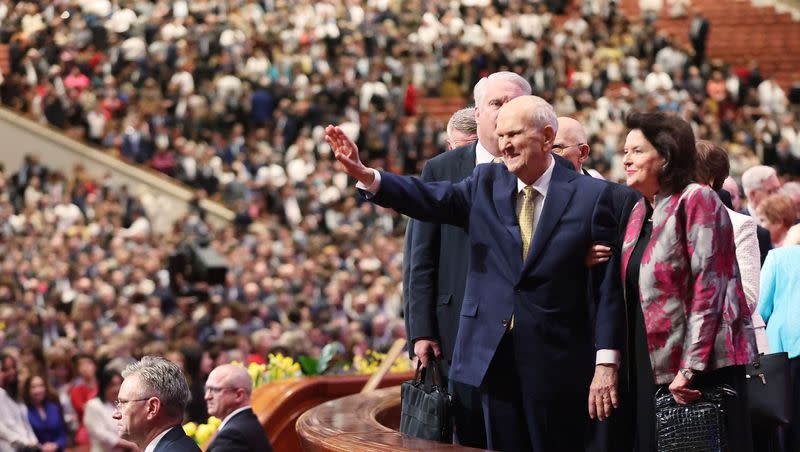Opinion: Science backs up President Nelson’s call for peacemaking

- Oops!Something went wrong.Please try again later.
By many measures, incivility is becoming a huge issue in the United States. Polls show Americans believe, with good reason, that respect and tolerance in civic dialogue is declining.
A Deseret News/Hinckley Institute of Politics poll last year found 90% of Utahns believing political debates have become less civil than they were in 2016, with 72% saying they were “much less civil.” When it comes to personal political discussions, 62% said these also had become less civil over the same time period.
A survey published in March by the Wall Street Journal and NORC at the University of Chicago found that the percentage of Americans who believe tolerance for others is “very important” had dropped from 80% in 2019 to 58% today — a remarkably quick decline.
Washington Post columnist Jennifer Ruben has written that the word “incivility” doesn’t really capture this crisis. “Airline passengers assaulting flight attendants, parents threatening school board members, customers haranguing store clerks or fellow shoppers — these have all become common occurrences,” she said, adding, “We’ve become impatient, selfish, self-absorbed and increasingly violent — all before the pandemic.”
Children and teenagers are particularly vulnerable. A 14-year-old girl in New Jersey recently committed suicide, allegedly after she was humiliated by a violent attack on her at school that was recorded and posted on social media. Four teenagers have been charged in connection with the attack.
Against such a backdrop, one could hardly conceive of a better message to the world than the one delivered by President Russell M. Nelson at the 193rd Annual General Conference of The Church of Jesus Christ of Latter-day Saints on Sunday.
Related
President Nelson urged church members to change the world one interaction at a time, “By modeling how to manage honest differences of opinion with mutual respect and dignified dialogue.”
He urged a communication standard that is “higher, holier.” Referring to the church’s 13th Article of Faith, he told members to confine their speech to that which is “virtuous, lovely, or of good report or praiseworthy” when speaking to or about other people.
Not only would this provide spiritual benefits, but President Nelson’s admonishment is backed by science. As zmescience.com recently reported, language has power. Studies show that “Sometimes when people speak of love or with love, we actually feel it, too. Conversely, hateful speech can make us feel uneasy, anxious, and perhaps hateful ourselves.”
While the science is emerging, one study found that insults are the equivalent of a “mini-slap in the face.”
Sometimes, the effects are surprising. Another study found that words of encouragement actually led people with chronic ankle instability to perform better on balance tests.
Related
So many of today’s fiercely debated topics on social media melt into insignificance when placed in an eternal perspective. So many mean words people cast casually would mortify them if they thought those words would be printed on their tombstone some day. Mortality puts behavior in perspective.
It’s worth remembering the final public words of former Arizona Sen. John McCain, who had been known at times for stinging candor.
He knew he was dying when he sent a letter to the “325 million opinionated, vociferous individuals” in America. He said: “… we have always had so much more in common with each other than in disagreement. If only we remember that and give each other the benefit of the presumption that we all love our country, we will get through these challenging times.”
That’s strong advice in and out of the political arena.
President Nelson, of course, was talking of something higher and more ennobling. He urged people to become peacemakers as “true disciples of Jesus Christ” should be.
It’s safe to say no one is led to Christ through nasty or invective speech. It’s also true, as President Nelson said, that “there is no room for prejudice, condemnation or contention of any kind” in verbal dialogue. “Let us show that there is a respectful way to resolve complex issues and an enlightened way to work out disagreements.”
This was a powerful message for anyone in today’s world to hear, but especially for those who profess to follow Christ. To follow President Nelson’s urgings may require ignoring the examples set by some people in influential positions.
But the results would be powerful. Now, more than ever, the nation, and the world, needs to devote itself, one person at a time, to using words of kindness, love and encouragement, especially when discussing deep differences.

